The Indian Holy Basil for Stress Relief and Immunity Boosting
Reviewed by: Dr .P Sri Kedara Surya | Author: Manoja Kalakanti
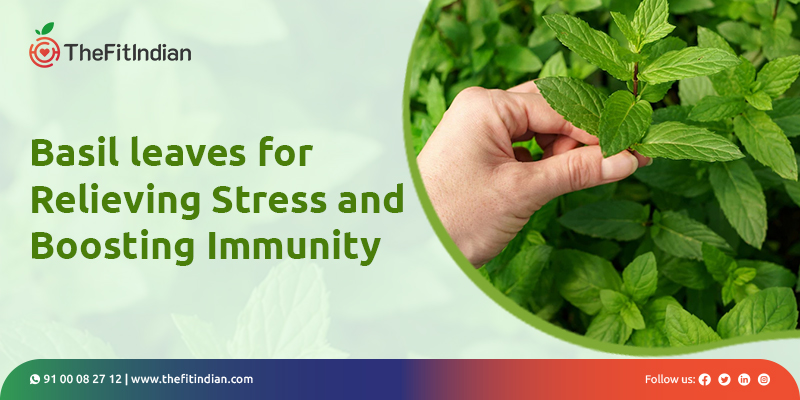 Basil leaves are not just the holy ingredient for your kitchen; they have a significant medicinal value. The Holy Basil, or Tulsi, is considered sacred in India and finds its place among rituals and various festivals. Contrarily, ancient Egyptians considered the leaves as an embalming supplement. One of the primary benefits of the herb would be combatting mental stress, which is the unexpected gift of modern life. The symptoms start from primary depression and gradually poison the whole immune system. Patients with excessive stress syndrome suffer from immune deficiency, making them vulnerable to various ailments. Therefore, a boosted immune system is a critical lifeguard protecting the human body from various infections and enabling the body to recuperate without any medication. However, a little touch of nature is needed to ensure your immune system is fully operational. This is where a dash of basil leaves added to your food regime can make all the difference.
Basil leaves are not just the holy ingredient for your kitchen; they have a significant medicinal value. The Holy Basil, or Tulsi, is considered sacred in India and finds its place among rituals and various festivals. Contrarily, ancient Egyptians considered the leaves as an embalming supplement. One of the primary benefits of the herb would be combatting mental stress, which is the unexpected gift of modern life. The symptoms start from primary depression and gradually poison the whole immune system. Patients with excessive stress syndrome suffer from immune deficiency, making them vulnerable to various ailments. Therefore, a boosted immune system is a critical lifeguard protecting the human body from various infections and enabling the body to recuperate without any medication. However, a little touch of nature is needed to ensure your immune system is fully operational. This is where a dash of basil leaves added to your food regime can make all the difference.
Basil Leaves – Nature’s Antidote or A Unique Condiment?
Basil can trace its lineage to the Indian subcontinent, often grown as a holy plant or a native ingredient throughout Southeast Asia. There are over 60 varieties of herbs belonging to the Basil family. From sweet basil, holy basil, and lemon basil to curly basil, these plants are grown all over the world.
Basil leaves are frequently consumed with herbal tea or experimented with as a unique culinary herb tea component adding a pungent flavor to your meals. They have carved a place for themselves in Indian, Thai, and Italian cuisines.
The uses of basil leaves are numerous, but they hold a fond place in ancient medicine like Ayurveda. Basil was consumed as a supplement to promote the long-term health of the respiratory tract, address stomach disorders and enhance digestion. It also helped enhance the quality of sleep. Furthermore, Basil leaves as medicines were earlier used as home remedies for colds and inflammation within nasal passages.
Basil Leaves – Nutrition Facts and Modern Medicinal Uses
Basil is composed of essential vitamins and nutrients, like Vitamin A, Vitamin K, Iron, Manganese, Calcium, and essential oils. The leaves are rich in antioxidants, such as beta-cryptoxanthin, zeaxanthin, lutein, and beta-carotene.
The antioxidant-rich oil extracted from the herb can effectively reduce the harmful effects of high oxidizing agents on humans. By neutralizing toxins and free radicals, Basil boosts enzyme activities and maintains the texture and elasticity of the skin. Moreover, the herb is known to eliminate harmful toxins from the blood and purify it naturally. A few show the antioxidant and anti-inflammatory features make the herb an alternative remedy for medical treatment.
Contrarily, the herb is known to lower blood glucose levels, empirically being used as a remedy for diabetic patients. Basil leaves for kidney stones effectively lower uric acid levels, which are responsible for stones and other kidney-related issues. It is often administered as a natural treatment to reduce stress and regularize sleep patterns. The leaves are rich in an anti-stress substance for fighting mental and behavioral disorders.
Basil Leaves Uses for Mind and Body
Basil leaves have been considered a natural immune booster, relieving the body and mind of toxic substances and easing the nervous system. Being an anti-depressant supplement, the herb reduces unnecessary stress and strengthens the immune system against various health ailments. Further, the herb checks blood sugar levels and lipid levels while bringing your weight back in balance. Therefore, Basil leaves for weight loss are a go-to homemade remedy.
A few of its other unique medicinal benefits are unfolded in the below-mentioned points:
Simplified Digestion: The uses of Basil leaves in food are numerous. When consumed with food, the herb can help balance digestive acids within the body, initiate anti-inflammatory action in the digestive tract, and restores the body’s pH level. These unique properties serve as a solid remedy for headaches and insomnia as they fortify the digestive and nervous systems.
Prevents Radical Damage: The natural antioxidants present in the plant protect body tissues against free radical damage. These free radicals are unstable atoms triggering oxidative stress and causing more damage to healthy cells. The water-soluble flavonoid antioxidants of Basil Leaves, also known as orientin and vicenary, act as potent antidotes protecting the cellular structure and DNA, strengthening the immune system, and delaying the effects of skin aging.
Acts as a Natural Skin Cleanser: Oil extracted from Basil Leaves act as a powerful solution for cleansing the skin from within. This natural skin cleanser is ideal for oily skin, effectively removing dirt and impurities and preventing clogged pores. Furthermore, its anti-inflammatory and antimicrobial properties prevent the formation of acne.
Manages Mental Stress Syndrome: The herb acts as a natural stimulant, triggering neurotransmitters and regulating the hormones inducing happiness and energy. Basil’s powerful adaptogen or anti-stress component and anti-inflammatory ingredient carry immune-boosting properties that help manage stress syndromes in depressed patients.
Induces Therapeutic Responses: As stated earlier, eugenol, a unique component of Holy Basil, prevents the interaction between SARS-CoV-2 Spike S1 (Severe Acute Respiratory Syndrome Coronavirus 2) and ACE2 (Angiotensin-Converting Enzyme 2), thereby inducing therapeutic responses.
Since the herb can easily be consumed orally or added as a special ingredient to your meal, keeping your health under check and easing mental stress is much easier. You do not require frequent health checkups or unnecessary doctor’s visits.
Nutritional Balance in Food – A Few Unique Recipes with Basil Leaves
The unique special point of Basil leaves is that the herb can be easily administered to your body as an everyday meal ingredient. Here are some interesting Basil tea recipes for you to try at home.
1. Basil Ginger Tea
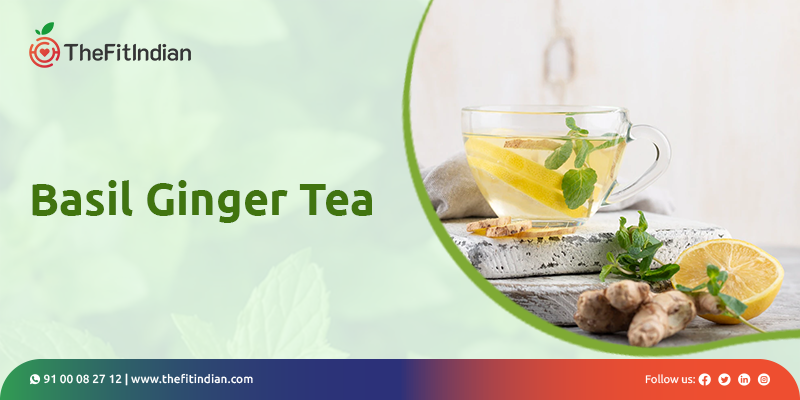 Ingredients:
Ingredients:
- Fresh basil leaves (handful)
- Fresh ginger slices –2 sliced
- Honey – 1tbsp
- Water –2 cups
Instructions:
- Boil the water, add the fresh basil leaves, and ginger slices
- Allow the ingredients to steep in the hot water for about 5-7 minutes
- Strain the tea into cups
- Add honey to taste for added flavor and sweetness
- Enjoy the warm and comforting basil ginger tea
Benefits:
- Stress relief
- Immune support
2. Basil Mint Tea
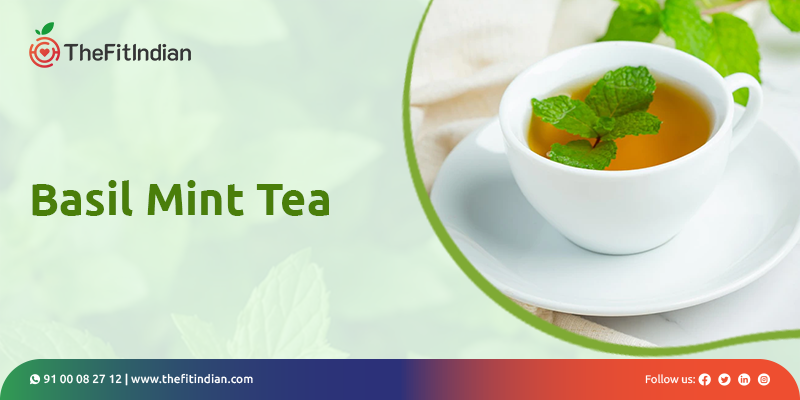
Ingredients:
- Fresh basil leaves (handful)
- Fresh mint leaves (handful)
- Honey -1tbsp
- Water-2 cups
Instructions
- Boil the water, add the fresh basil, and mint leaves
- Let the leaves steep in the hot water for about 5-7 minutes
- Strain the tea into cups
- Add honey to taste for a touch of sweetness
- Sip on this invigorating and aromatic basil mint tea
Benefits:
- Antioxidant-rich
- Blood pressure regulation
3. Basil Lemon Tea
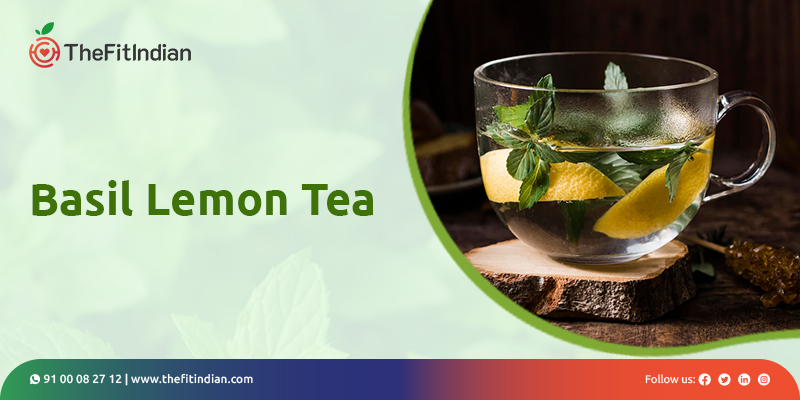
Ingredients
- Fresh basil leaves (handful)
- Lemon juice (from 1 lemon)
- Honey -1tbsp
- Water –2 cups
Instructions
- Boil the water and add the fresh basil leaves
- Allow the basil leaves to steep for 5-7 minutes
- Strain the tea into cups
- Add freshly squeezed lemon juice and honey to taste
- Stir well and enjoy this refreshing and tangy basil lemon tea
Benefits
- Boost immunity
- Weight management
4. Classic Basil Infusion
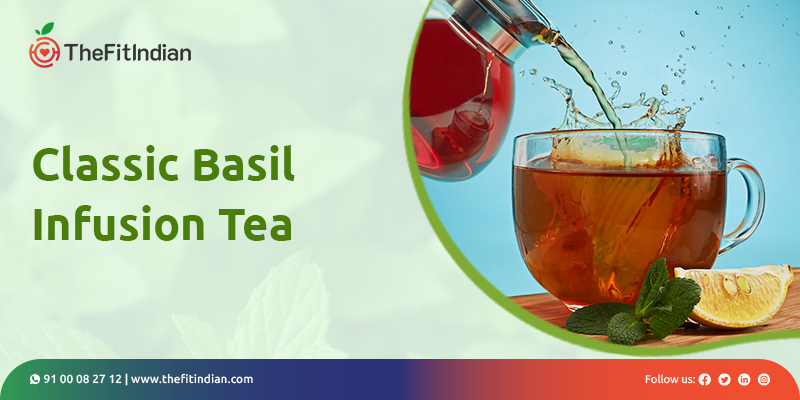
Ingredients
- Fresh basil leaves –5-10 leaves
- Water – 2 cups
- Honey – 1tbsp
Instructions
- Boil water and let it cool slightly.
- Place the fresh basil leaves in a teapot or cup.
- Pour the hot water over the basil leaves.
- Cover and steep for about 5-7 minutes.
- Strain the tea to remove the basil leaves.
- Add honey as desired taste.
- Enjoy your classic basil infusion!
Benefits
- Detoxification
- Lowers blood pressure
5. Basil Mint Medley Tea
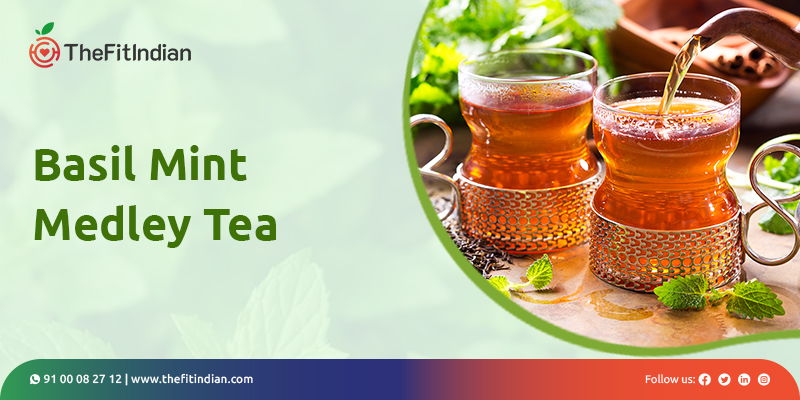
Ingredients
- Basil leaves –5 to 10
- Mint leaves –5
- Water-2 cups
- Honey or Lime juice- 1tbsp
Instructions
- Boil the water and then remove it from the heat.
- In a teapot or cup, combine the fresh basil leaves and fresh mint leaves.
- Pour the hot water over the herbs.
- Allow the mixture to steep for about 5-7 minutes.
- If desired, add honey or lime for a touch of sweet and sour tangy taste
- Enjoy the medley tea with healthy snacks
Benefits
- Anti-inflammatory
- Oral health
Conclusion
Basil leaves are unique natural herbs that serve multiple purposes. Their contribution to ancient and modern medicine is immense, from mild to severe ailments. The herb is Nature’s antidote and immune boosting supplement helping humans to fight mental stress, basic illness and prevent severe conditions in their homes. Using it as a culinary ingredient and adding the leaves to your daily diet will act as a preventive remedy, relieving you from frequent doctor visits. So, add Basil to your daily food regime and keep illness at bay.
One leaf a day can easily keep doctors away!
FAQs
Consuming Basil leaves on an empty stomach early in the morning will help maintain a healthy mind and happy digestive system throughout the day.
The benefits are numerous and cover the following:
Maintain mind health
Detoxify the body
Simplify digestion
Prevent severe ailments
The leaves contain acetic acid that helps dissolve kidney stones.
Yes, lesser amounts of Basil soaked in water can be consumed daily to fight oxidative stress, depression, and inflammation in the body while maintaining skin health.
The antioxidants and anti-bacterial properties of Basil detoxify the body, thereby preventing various digestive and skin-related ailments.
Basil is a nutrient powerhouse. It is a valuable source of various nutrients and minerals, like vitamin K and manganese, copper, vitamin A, vitamin C, calcium, iron, folate, magnesium and omega-3 fatty acids.
There are three primary medicinal uses of Basil, namely:
Preventing loss of appetite
Relieving mental stress
Boosting immune system
Holy Basil is used as an herbal ingredient in tea to soothe a troubling stomach. It protects against stomach ulcers while easing stomach pain, heartburn, and nausea.
The benefits of consuming Basil leaves would be:
Regulated blood sugar levels
Reduced inflammation
Prevented heart diseases
Various compounds present in the leaves and seeds of the Holy Basil plant help reduce uric acid levels, soothing the pain from inflammatory conditions like gout and rheumatoid arthritis.

Manoja Kalakanti